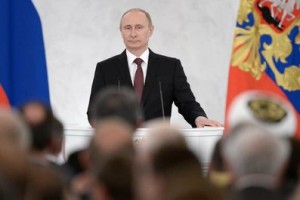Cross-posted from Consortium News

Sometimes dealing with the waves of U.S. media propaganda on the Ukraine crisis feels like the proverbial Dutch boy putting his fingers in the dike. The flood of deeply prejudiced anti-Russian "group think" extends across the entire media waterfront -- from left to right -- and it often seems hopeless correcting each individual falsehood.
The problem is made worse by the fact that the New York Times, the traditional newspaper of record, has stood out as one of the most egregious offenders of the principles of journalism. Repeatedly, the Times has run anti-Russian stories that lack evidence or are just flat wrong.
The other type of Times' propaganda -- making assertions without evidence -- appeared in another front-page story about Russian President Vladimir Putin's phantom wealth ($40 billion to $70 billion, the Times speculated) without presenting a shred of hard evidence beyond what looked like a pricy watch on his wrist.
However, in some ways, the worst of the New York Times reporting has been its slanted and erroneous summations of the Ukraine narrative. For instance, immediately after the violent coup overthrowing elected President Viktor Yanukovych (from Feb. 20-22), it was reported that among the 80 people killed were more than a dozen police officers.
But, as the pro-coup sympathies hardened inside the Times, the storyline changed to: "More than 80 protesters were shot to death by the police as an uprising spiraled out of control in mid-February." [NYT, March 5]
Both the dead police and the murky circumstances surrounding the sniper fire that inflicted many of the casualties simply disappeared from the Times' narrative. It became flat fact: evil "pro-Yanukovych" police gunned down innocent "pro-democracy" demonstrators. Also consigned to the memory hole was the key role played by well-organized neo-Nazi militias that led the final assaults on the police.
More recently, the Times' Ukraine summary has challenged Putin's denials that Russian special forces are operating in eastern Ukraine (the point that the bogus photo scoop was supposed to prove). So, now whenever Putin's denial is noted, the Times contradicts him by claiming that he made the same denial about Crimea, that Russian troops weren't involved, and then reversed himself later.
For instance, in Friday's editions, the Times wrote: "Mr. Putin has said there are no Russian troops in eastern Ukraine. He made similar claims during the annexation of Crimea, however, and then later acknowledged the existence of a Russian operation."
But that simply isn't true. The Russians never denied having troops in Crimea, since that's where they maintain a major Black Sea naval base in Sevastopol and had a contractual agreement with Ukraine allowing the presence of up to 25,000 troops. At the time of the Feb. 22 coup, Russia had about 16,000 troops in Crimea and that was well known as Crimea began to break away from the post-coup regime in Kiev.
On March 4, the Associated Press reported that...
"The new Ukrainian leadership that deposed the pro-Russian Yanukovych ... has accused Moscow of a military invasion in Crimea. The Kremlin, which does not recognize the new Ukrainian leadership, insists it made the move in order to protect Russian installations in Ukraine and its citizens living there."On Tuesday, Russian troops who had taken control of the Belbek air base in the hotly contest[ed] Crimea region fired warning shots into the air as around 300 Ukrainian soldiers, who previously manned the airfield, demanded their jobs back. ...
"The shots reflected tensions running high in the Black Sea peninsula since Russian troops -- estimated by Ukrainian authorities to be 16,000 strong -- tightened their grip over the weekend on the Crimean peninsula, where Moscow's Black Sea Fleet is based.
"Ukraine has accused Russia of violating a bilateral agreement on conditions of a Russian lease of a naval base in Crimea that restricts troop movements, but Russia has argued that it was acting within the limits set by the deal.
"Russia's ambassador to the United Nations, Vitaly Churkin, said Monday [March 3] at the U.N. Security Council that Russia was entitled to deploy up to 25,000 troops in Crimea under the agreement. Churkin didn't specify how many Russian troops are now stationed in Crimea, but said that 'they are acting in a way they consider necessary to protect their facilities and prevent extremist actions.'"
Putin's Comments
Also on March 4, Putin discussed another public confrontation in Crimea at a Moscow press conference. He said:
(Note: You can view every article as one long page if you sign up as an Advocate Member, or higher).





